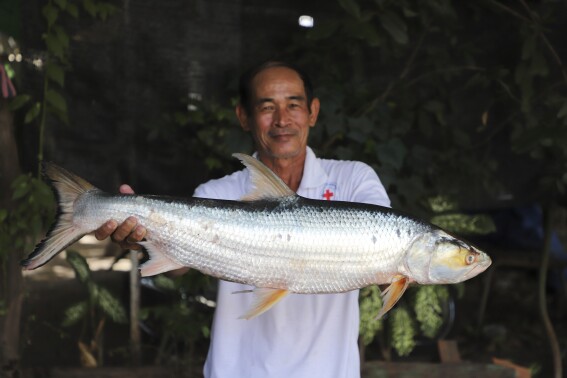The Mekong River "ghost fish", believed to have been extinct, has been sighted three times in recent years, according to a new report published on Monday.
According to the study published in Biological Conservation, the species seemed to have vanished from the Mekong for decades, but the sightings have renewed hopes for the survival of the fish.
The giant salmon carp is known for its distinctive appearance and symbolic significance in the Mekong region.
"The giant salmon carp is like a symbol of the Mekong region," said Chheana Chhut, a researcher at Cambodia's Inland Fisheries Research and Development Institute.
The fish can grow up to 4 feet long and has a noticeable knob at the tip of its lower jaw and a yellow patch surrounding its large eyes. It can grow as large as 66 pounds.
The last confirmed sighting was in 2005.
According to Chhut, who co-authored the study, the species seemed to have vanished from the Mekong for decades.
Since 2017, biologists in Cambodia have been collaborating with local fishing communities, urging them to report any unusual sightings.
This strategy led to the identification of three giant salmon carp between 2020 and 2023 in the Mekong River and one of its tributaries.
"I was really surprised and excited to see the real fish for the first time," said Bunyeth Chan, a co-author of the study and researcher at Svay Rieng University.
Nicknamed the "ghost fish," the rediscovery of the giant salmon carp has brought optimism among conservationists.
"This rediscovery is very exciting, positive news," said Zeb Hogan, a fish biologist at the University of Nevada, Reno, and part of the research team.
Migratory species in the Mekong River face broader challenges and are under threat from industrial pollution, overfishing, and infrastructure development.
More than 700 dams have been constructed along the river and its tributaries, with few effective passages for fish to navigate these barriers, according to Brian Eyler, director of the Southeast Asia Program at the Stimson Center in Washington, who was not involved in the study.
The massive expansion of hydroelectricity schemes has been partly financed by Laos borrowing money from China, as the global power gains increasing influence in the region.
The new dams have also threatened traditional river livelihoods.
"The Chinese come and take all the resources from the land, and the government gets all the benefits while we get nothing," complained Noi, a Mekong River boatman whose life of fishing and gathering river weeds has been turned upside down by the changes.
Researchers hope to extend their collaboration to communities in Thailand and Laos, in an effort to confirm whether the giant salmon carp still inhabits other stretches of the Mekong.
This article includes reporting from The Associated Press
Disclaimer: The copyright of this article belongs to the original author. Reposting this article is solely for the purpose of information dissemination and does not constitute any investment advice. If there is any infringement, please contact us immediately. We will make corrections or deletions as necessary. Thank you.



